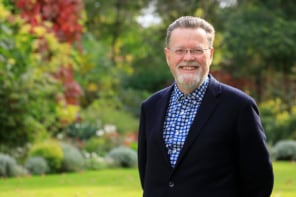Julian Barbour is a modern-day equivalent of the "gentleman scientist". He works at home on the foundations of physics and tells Matin Durrani why he believes that time does not exist.
It was a beautiful October afternoon in 1963 when Julian Barbour’s life changed forever. He was travelling by train with a student friend to climb the Watzmann in the Bavarian Alps when he started reading an article in Scientific American by Paul Dirac. The article questioned whether it was correct to unify the concepts of space and time into space-time: Dirac appeared to be challenging one of the tenets of modern physics.
Barbour never climbed the mountain. After spending the night in a hillside hut, he woke early the following morning with a splitting headache and spent the rest of the day thinking about nothing except the meaning of time. “The article just sparked something in me,” he recalls, “and I started saying: ‘What is time?’ ”
The question has teased and tormented the 62-year-old Barbour ever since. Shortly after the trip to the Alps, he abandoned plans to study astronomy at Munich, and – with a maths degree from Cambridge under his belt – moved to Cologne, where he did a PhD in general relativity instead. But whereas many physicists would then have opted for the safety of a conventional academic career, Barbour realized that the only way to really understand time would be to become an “independent” scientist, free from the demands of university life.
He toyed briefly with the idea of working with John Wheeler at Princeton, and then sought the advice of Felix Pirani, a general relativist at King’s College London. “He said to me, ‘If you want to go into a career position, you have to produce two solid research papers a year, and do your lectures, and do your administration. Can you do it?’ ” Barbour didn’t think he could.
So he returned to England and in 1969 settled down in the Oxfordshire village where he had grown up. Barbour bought a farmhouse using money given to him by his father as a way of avoiding death duties and supported his family by translating Russian scientific journals into English. “I could churn out 50-60 pages of theoretical physics a day and was basically earning a professorial salary,” he says. Barbour continued the work until 1997, when his pension fund was large enough for him to “retire”.
However, the translating was “pretty dull”, and little more than a means to an end. “The real thing that has kept me going all these years has been this very basic fact that time is just completely invisible – you can’t get your hands on it,” Barbour tells me. “You go and look in all the books on dynamics and see if anybody tells you what time is, and they won’t! They just don’t ask this question.”
As most physicists know, Newton set up an invisible rigid framework of absolute space and time in which physics unfolds. The problem, as Barbour sees it, is that quantum mechanics is still formulated in a Newtonian framework. Absolute space and time still exist in the quantum world, even when combined in the space-time of special relativity. Barbour sees this as the source of the other main problem with quantum mechanics, namely that it is incompatible with general relativity. If you try to quantize the electromagnetic, weak and strong forces of nature, everything works out fine. But when you try to quantize the gravitational force to create “quantum gravity”, it all goes horribly wrong.
Barbour’s solution to these fundamental problems is both stunning and simple: he proposes that time does not exist. He sees the possible states of space and matter in the universe as “snapshots”, like the frames of a film. “What we see as an instant of time is just like freezing the universe and seeing where everything is.” He claims that all of Newtonian mechanics can be explained without invoking absolute space and time, and believes that “quantum cosmology” can also be formulated without them.
But if we live in a timeless universe, how do we get the impression that time exists? According to Barbour, the main evidence for time comes from our direct experience of seeing motion and experiencing things changing. “You always have to see something moving to say that time has passed,” says Barbour, waving his hand in front of me. “At any instant, information about several different positions of my hand could be coded in the neuronal patterns in your brain,” he explains. “They’re all there at once, and the brain is playing the movie for you. What we think of as the flow of time – and even seeing motion – is actually an illusion.” Barbour believes that his ideas will help to understand “instants of time”, without supposing that they belong to something that flows relentlessly forward.
All this might sound far-fetched, but Barbour’s ideas are supported by some physicists. The cosmologist Lee Smolin, for example, calls Barbour’s theory “the most interesting and provocative new idea about time to be proposed in many years”. And although other physicists see Barbour’s work as less revolutionary, he has just written a book The End of Time of which his publishers have high hopes – some 20 000 copies have already been printed.
Barbour is not sure how the book will be received. “I’m apprehensive and I’m sure I shall get some flak [from working scientists]. I’m sure some people will say this is too simple-minded or he just doesn’t know the full details of quantum mechanics. I could be laughed off the stage.” Indeed, he admits that while he has found lots of evidence to support his conjecture that time does not exist, he has “nowhere near anything that’s remotely approaching a proof”.
Barbour has no regrets over the life he chose. He would spend five weeks every spring and summer working with his Italian collaborator Bruno Bertotti from the University of Pavia, and regularly attended lectures and conferences. “It was an existence on the periphery of academia. One was never totally independent, but it had a lot of plusses. You could do exactly what you wanted, and you didn’t get aggravation with colleagues.” Barbour also did not have to worry about publishing – although he has 15 papers to his credit – and not having to apply for grants was “absolute bliss”.
However, Barbour admits that the life of an independent would not suit everyone. “It definitely worked for me because I certainly don’t seem to need a huge amount of direct interaction with people. Reading a good book or scientific paper gives me a terrific amount of stimulus.” And he warns young post-docs who might want to follow the path he took to be careful: “You’ve got to be really serious about wanting to do the research.”
As for his ideas about time, where does he see himself in the grand scheme of things? Drawing a parallel with the man who laid the foundations for Newtonian mechanics, Barbour concludes: “At my most wildly ambitious, I would be playing Descartes’ role in seeing a new picture of the world. But it will take a much better mathematician and theoretical physicist than me to put substance into my conjectures.”



